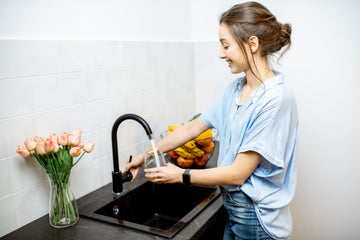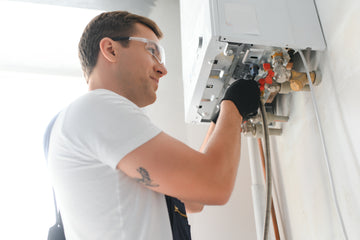Hard water, characterized by a high concentration of minerals like calcium and magnesium, is a common issue in many households. While it's not harmful to health, hard water can cause various problems, ranging from aesthetic concerns to potentially damaging effects on plumbing and appliances. In this blog post, we’ll explore effective strategies for dealing with hard water, ensuring your home runs smoothly and efficiently.
Understanding Hard Water
Hard water occurs naturally when water percolates through deposits of limestone and chalk. The minerals dissolved in the water can lead to several household challenges, including scale buildup in pipes, reduced efficiency of soaps and detergents, and spots on dishes and fixtures.
Recognizing the Signs of Hard Water
1. Scale Buildup: White, chalky deposits around faucets, showerheads, and kettles.
2. Spotty Dishes: Glasses and silverware that come out of the dishwasher looking spotty or cloudy.
3. Reduced Soap Lather: Difficulty in getting soap to lather, leading to higher usage of detergents.
4. Dry Skin and Hair: The minerals in hard water can strip moisture, leaving skin feeling dry and hair looking dull.
Dealing with Hard Water: Effective Solutions
1. Install a Water Softener
The most comprehensive solution to hard water is installing a water softener. It works by exchanging the calcium and magnesium ions in hard water with sodium or potassium ions, effectively softening the water.
2. Use Vinegar for Cleaning
Vinegar is an effective, natural solution for removing hard water stains. Use it to clean faucets, showerheads, and even in your dishwasher or washing machine to combat the effects of mineral deposits.
3. Invest in Water Softening Shower Heads and Filters
Specialized shower heads and filters can soften water as it flows through, reducing the impact of hard water on your skin and hair.
4. Use Hard Water Cleaning Products
Some cleaning products are specifically designed to be more effective in hard water. They can help in reducing soap scum and mineral buildup.
5. Regularly Descale Appliances
Appliances like kettles, coffee makers, and dishwashers are prone to scale buildup. Regular descaling can prolong their life and efficiency. Many descaling products are available, or you can use a DIY solution of water and vinegar.
6. Consider a Magnetic or Electronic Water Conditioner
As an alternative to traditional water softeners, magnetic and electronic water conditioners are devices that alter the electromagnetic properties of the minerals in hard water, reducing scale buildup.
Long-Term Management and Awareness
While these solutions can mitigate the effects of hard water, it's also important to be proactive in maintaining your plumbing and appliances. Regular checks and cleaning can prevent long-term damage caused by mineral buildup.
Conclusion
Dealing with hard water can be a challenge, but with the right strategies and tools, you can effectively manage its effects and protect your home and appliances. Whether you choose to install a water softener, use vinegar for cleaning, or invest in specialized filters, these solutions can significantly improve your water quality and make your daily household tasks more efficient. Remember, understanding the specific characteristics of the water in your area can help you choose the most effective approach for your home.






